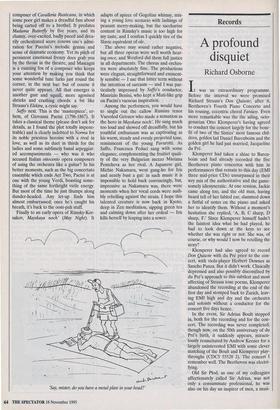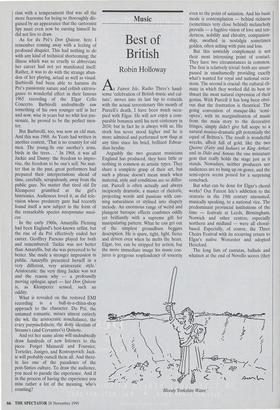Records
A profound disquiet
Richard Osborne
It was an extraordinary programme. Before the interval we were promised Richard Strauss's Don Quixote; after it, Beethoven's Fourth Piano Concerto and his rousing, eccentric choral Fantasy. Even more remarkable was the the ailing, octo- genarian Otto Klemperer's having agreed to conduct the concert largely for the bene- fit of two of the Sixties' most famous chil- dren, golden lad Daniel Barenboim and the golden girl he had just married, Jacqueline du Pre.
Klemperer had taken a shine to Baren- boim and had already recorded the five Beethoven piano concertos with him in performances that remain to this day (EMI three mid-price CDs) unsurpassed in their wry mix of the authoritative and the game- somely idiosyncratic. At one session, Jackie came along too, and the old man, having heard tell of her fabled ear, slammed down a fistful of notes on the piano and asked her to identify them. Without a moment's hesitation she replied, 'A, B, C sharp, D sharp, F.' Since Klemperer himself hadn't the faintest idea what he had played, he had to look down at the keys to see whether she was right or not. She was, of course, or why would I now be retelling the story?
Klemperer had also agreed to record Don Quixote with du Pre prior to the con- cert, with viola-player Herbert Downes as Sancho Panza. But it didn't work. Clinically depressed and also possibly discomfited by du Pro's approach to this subtlest and most affecting of Strauss tone poems, Klemperer abandoned the recording at the end of the first day and stomped back to Zurich, leav- ing EMI high and dry and the orchestra and soloists without a conductor for the concert five days hence.
In the event, Sir Adrian Boult stepped in, both for the recording and for the con- cert. The recording was never completed; though now, on the 50th anniversary of du Pre's birth, it suddenly appears, miracu- lously resuscitated by Andrevi Keener for a largely uninterested EMI with some clever matching of the Boult and Klemperer play- throughs (CDC5 55528 2). The concert I remember well. The Beethoven was electri- fying.
Old Sir Plod, as one of my colleagues affectionately called Sir Adrian, was not only a consummate professional, he was also on his day an inspirer of men, a musi- cian with a temperament that was all the more fearsome for being so thoroughly dis- guised by an appearance that the cartoonist Spy must even now be cursing himself he did not live to draw.
As for du Pre's Don Quixote, here I remember coming away with a feeling of profound disquiet. This had nothing to do with any kind of technical shortcoming; the illness which was so cruelly to abbreviate her career had not yet manifested itself. Rather, it was to do with the strange aban- don of her playing, actual as well as visual. Barbirolli had been able to harness du Pre's passionate nature and coltish extrava- gance to wonderful effect in their famous 1965 recording of the Elgar Cello Concerto. Barbirolli undoubtedly saw something of his own younger self in her and now, wise in years but no whit less pas- sionate, he proved to be the perfect men- tor.
But Barbirolli, too, was now an old man. And this was 1968. As Yeats had written in another context, 'That is no country for old men. The young/In one another's arms, birds in the trees ...' In 1968, it was all Jackie and Danny: the freedom to impro- vise, the freedom to be one's self. No mat- ter that in the past, great performers had prepared their interpretations ahead of time, carefully, scrupulously, away from the public gaze. No matter that tired old Dr Klemperer grumbled at the girl's histrionics. Audiences loved it, as did tele- vision whose predatory gaze had recently found itself a new subject in the form of the remarkable species interpretatus musi- cus.
In the early 1960s, Amaryllis Fleming had been England's best-known cellist, but the rise of du Pre effectively ended her career. Geoffrey Parsons played for both and remembered: 'Jackie was not better than Amaryllis, but she was perceived to be better. She made a stronger impression in public. Amaryllis presented herself in a very different, very aristocratic style.' Aristocratic: the very thing Jackie was not and the reason why — a profoundly moving epilogue apart — her Don Quixote is, as Klemperer sensed, such an oddity.
What is revealed on the restored EMI recording is a bull-in-a-china-shop approach to the character. Du Pre, the untamed romantic, misses almost entirely the wit, the aristocratic nonchalance, the crazy purposefulness, the dotty idealism of Strauss's (and Cervantes's) Quixote.
And yet her name alone will undoubtedly draw hundreds of new listeners to the piece. Forget Mainardi and Fournier, Tortelier, Janigro, and Rostropovich: Jack- ie will probably outsell them all. And there- in lies one of the paradoxes of the post-Sixties culture. To draw the audience, you need to parade the experience. And if in the process of having the experience you miss rather a lot of the meaning, who's counting?



















































































 Previous page
Previous page